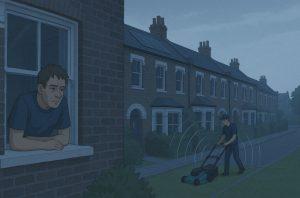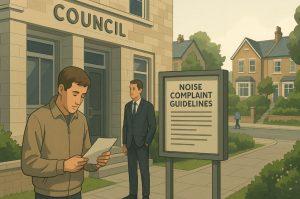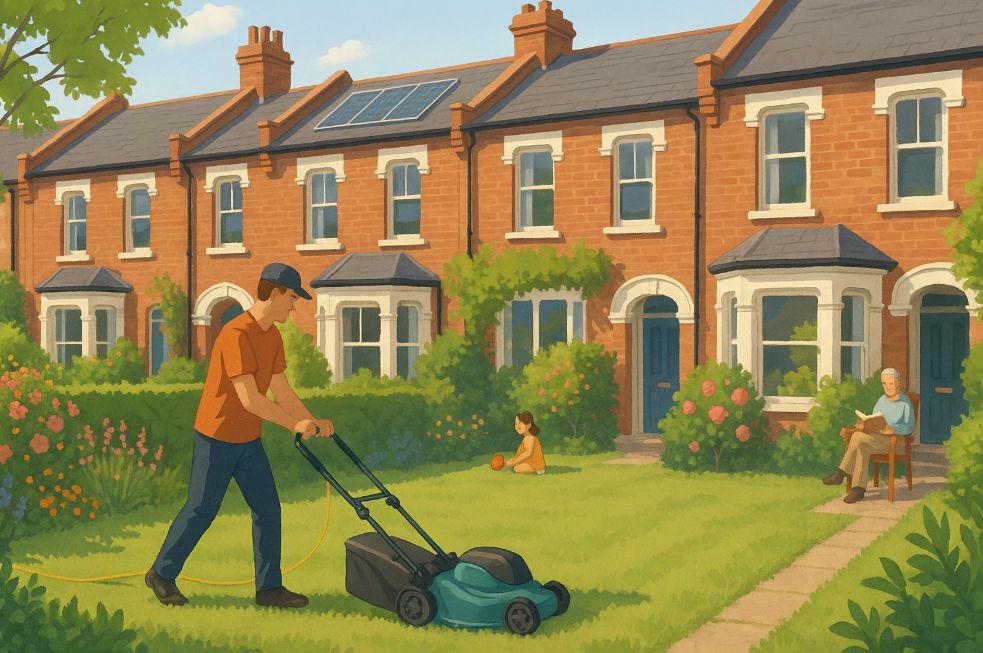Keeping your lawn tidy is a sign of responsible homeownership, but it’s important to know that lawn mowing isn’t just about personal preference. it can impact your neighbourhood.
In the UK, there’s no universal national law stating exactly when you can mow your lawn, but there are widely accepted guidelines and local council rules that regulate noise and protect peace in residential areas.
This article explores the legal time to mow your lawn in the UK, especially in urban settings like London, and explains the regulations, council rules, and best practices homeowners should know.
Why Are There Restrictions on Lawn Mowing Times in the UK?

Lawnmowers, especially petrol-powered ones, generate considerable noise often over 85 decibels. In built-up areas, this can disturb neighbours, particularly during early mornings, evenings, weekends, or holidays. To manage this, noise control standards are enforced by councils under environmental protection laws.
Understanding the Impact of Noise Pollution
Excessive noise from garden equipment contributes to urban noise pollution. Local councils receive complaints from residents when noisy equipment is used during anti-social hours. Over time, such complaints have led to established informal and formal guidelines that define when it’s acceptable to use these tools.
What Times Are Legally Acceptable for Lawn Mowing in the UK?
There isn’t a single law that applies across the UK, but councils typically agree on general quiet and acceptable hours.
Commonly Accepted Mowing Hours
Most UK councils recommend mowing during the following hours:
| Day | Acceptable Mowing Times |
| Monday – Friday | 7:00 AM – 8:00 PM |
| Saturday | 8:00 AM – 8:00 PM |
| Sunday | 10:00 AM – 4:00 PM |
| Bank Holidays | 10:00 AM – 4:00 PM |
These times are guidelines and not strict laws. However, repeated violations can be classed as a statutory nuisance.
Are There Different Lawn Mowing Laws for Weekdays and Weekends?
Yes. Many local councils and community guidelines distinguish between weekdays and weekends due to differing routines.
Weekend Mowing Expectations
People generally expect more peace on weekends, so Sunday hours are stricter usually starting later in the morning and ending earlier in the evening. For instance, mowing at 8:00 AM might be acceptable on a weekday but too early on a Sunday.
Can Local Councils Set Their Own Mowing Time Rules?

While national laws do not set specific mowing hours, local authorities have the power to implement their own rules regarding noise.
Council Discretion on Noise
Each borough or council can define quiet hours or enforce noise restrictions if residents complain. For example, the London Borough of Camden may respond differently from Westminster or Hackney. If repeated complaints occur, the council may investigate and take legal steps.
What Happens If You Mow the Lawn Outside Legal Hours?
Using a noisy lawnmower outside of acceptable times might result in warnings or formal action from your local council, especially if complaints have been made.
Councils can issue a Noise Abatement Notice under the Environmental Protection Act 1990. If ignored, this can result in fines up to £5,000 and, in rare cases, the confiscation of your lawnmower or other noisy equipment.
How Can You Handle Disputes with Neighbours Over Lawn Mowing Noise?
Disagreements between neighbours over noise are common. It’s best to approach the situation with understanding and clear communication.
Start by having a friendly conversation with your neighbour. Let them know how their mowing schedule is affecting your peace. If informal discussions don’t help, you can file a noise complaint with your local environmental health team, who may then investigate.
Are There Exceptions for Commercial Gardeners or Landscapers?

Yes. Professional gardeners and landscapers are often governed by different guidelines, especially in commercial or public properties.
Working Hours for Contractors
Professional landscapers usually follow local business hours typically between 8:00 AM and 6:00 PM. However, they still must follow local council rules regarding noise and may need special permission for early or late work in residential areas.
How Can You Be a Considerate Neighbour While Mowing the Lawn?
Mowing within recommended hours is one way to be respectful, but other actions can also help maintain good relationships with neighbours.
Choose quieter electric mowers when possible and avoid mowing during mealtimes, school drop-offs, or times when your neighbours may be resting or hosting guests. If you’re planning a longer or particularly noisy session, give neighbours advance notice as a courtesy.
What Does the Environmental Protection Act Say About Noise Nuisance?
In the UK, the Environmental Protection Act 1990 is the principal legislation used to manage noise complaints, especially in residential settings. Under this law, local councils are empowered to investigate and take action against individuals or households that cause ongoing disturbances through excessive noise.
How the Act Applies to Lawn Mowing
Although mowing your lawn isn’t illegal in itself, the context, timing, and frequency can turn it into a statutory nuisance if it regularly disrupts neighbours. The key factor is whether the noise is deemed “unreasonable” and if it affects others’ comfort and quality of life. For example, frequent lawn mowing late in the evening or very early in the morning may lead to formal complaints even if the activity is lawful in moderation.
Council Powers and Enforcement
When a complaint is filed, environmental health officers assess the situation and may monitor noise levels. If they determine that the lawn mowing qualifies as a statutory nuisance, they can issue a Noise Abatement Notice. This legally requires the homeowner to stop or alter their mowing habits. Non-compliance with the notice can result in fines of up to £5,000 and, in extreme cases, the seizure of noisy equipment.
Importance of Reasonable Use
The law is not designed to penalise normal gardening habits, but rather to protect residents from consistent disturbances that can harm their mental well-being or daily functioning. It’s all about finding a balance between routine maintenance and neighbourhood courtesy.
What Are the Best Practices for Lawn Mowing in Residential Areas?

In busy cities like London and other UK residential zones, mowing your lawn is part of responsible homeownership but it should be done with consideration for your neighbours. Following best practices ensures you stay within the law while maintaining a pleasant community environment.
Maintain Your Mower Regularly
Keeping your lawnmower in good condition is not only essential for performance but also for reducing noise levels. Dull blades, loose components, and worn-out engines create unnecessary sound. Regular maintenance including blade sharpening, engine servicing, and part inspections ensures smoother and quieter operation.
Choose the Right Equipment
The type of lawnmower you use greatly impacts how much noise you generate. Electric and battery-powered mowers are significantly quieter than traditional petrol models and are better suited for smaller urban gardens. For even quieter operation, consider a manual push mower, which is virtually silent and ideal for compact lawns.
Mow at Considerate Times
Timing is everything when it comes to mowing in residential areas. The best times are usually mid-morning to early evening, when most people are awake and active but not yet winding down. Avoid mowing very early in the morning or late at night, especially on weekends and holidays when people are more likely to be resting.
Respect Local Guidelines
Many UK councils offer specific recommendations or informal rules for when it’s acceptable to carry out noisy gardening tasks. Following these guidelines not only keeps you in compliance but also shows respect for your neighbours’ right to peace and quiet.
Combine Efficiency with Courtesy
Efficient mowing, both in technique and timing, leads to quicker, quieter lawn care. Plan your mowing days around the weather, avoid mowing damp grass, and try to complete your work during daylight hours when noise is more tolerable.
How Early Is Too Early to Mow the Lawn in London?
In most London boroughs, mowing before 7:00 AM on weekdays or before 10:00 AM on Sundays is considered too early. These times are based on general public tolerance and council recommendations.
City Living Considerations
Because of London’s density, sound travels easily. Even when you’re mowing within acceptable times, be aware of how it might affect flats or multi-unit dwellings nearby.
What Should You Do If a Neighbour Frequently Mows Outside Legal Hours?
Living in close quarters, especially in urban areas like London, means that noise from neighbours is inevitable. However, when someone consistently mows their lawn during unsociable hours early in the morning or late in the evening.
it crosses from being a minor inconvenience to a potential disturbance. If this behaviour becomes habitual and disrupts your peace, it’s important to take a calm, structured approach to resolve the issue.
Step 1: Communicate Directly and Respectfully
The first step should always be a friendly conversation. Sometimes, people are simply unaware that their lawn mowing is causing distress. Approach your neighbour politely and express how the noise is affecting your daily routine, especially if it’s impacting sleep, working hours, or family time. Use a tone of cooperation, not confrontation. Most people are willing to adjust their behaviour once made aware.
Tip: Choose a calm time to speak preferably in person and avoid escalating the issue with aggressive language or notes through the door.
Step 2: Keep a Noise Diary
If the mowing continues at unsociable hours despite your conversation, begin documenting the incidents. Record the exact dates, times, and durations of the noise, and note how it impacts you whether it wakes up your children, disturbs your remote work, or interrupts your rest. This log will serve as important evidence if you need to involve your local council later.
A well-kept noise diary helps establish a pattern of behaviour, demonstrating that the issue is persistent and not an isolated event.
Step 3: Gather Supporting Evidence (If Possible)
In addition to your diary, consider capturing audio or video recordings (if safe and legal to do so) that reflect the disruption. Ensure that you’re only recording from within your own property to avoid privacy issues. This additional evidence can strengthen your case should you escalate the matter.
Step 4: Report to the Local Council’s Environmental Health Department
Once you’ve gathered enough information and the issue hasn’t resolved through discussion, you can file a formal complaint with your local council’s Environmental Health department. Most London boroughs have online reporting portals or helplines specifically for noise complaints.
Include the following in your report:
- Your noise diary
- Any recordings or additional documentation
- A summary of any attempts made to resolve the matter directly
The council will typically assess the complaint and, if necessary, begin an investigation. This may include monitoring equipment, visits to your property, or direct contact with the neighbour.
Step 5: Understand Potential Outcomes
If the council finds the complaint valid, they can issue a Noise Abatement Notice under the Environmental Protection Act 1990. This legally requires your neighbour to stop or reduce the noise. Ignoring the notice can lead to legal consequences, such as:
- Fines of up to £5,000 for domestic properties
- Seizure of equipment, such as a lawnmower
- Possible court action for repeated breaches
This process ensures that the matter is handled through proper legal channels, avoiding personal conflict while restoring peace in your neighbourhood.
Is There a Noise Level Limit for Lawnmowers in the UK?
Noise from garden equipment like lawnmowers is regulated in the UK to help maintain a quieter environment, particularly in densely populated areas. While there are no set decibel limits for individual users, manufacturers must comply with strict noise emission standards before their products can be sold in the UK.
UK and EU Regulations on Lawn Mower Noise
Lawnmowers and similar outdoor machinery are covered under the Noise Emission in the Environment by Equipment for Use Outdoors Regulations 2001, which incorporate EU standards into UK law. These regulations ensure that machinery meets specific noise thresholds and that clear labelling is provided to inform consumers about the equipment’s sound output.
Every lawnmower must have a visible noise rating label, typically displayed in decibels (dB). This helps users understand how loud the equipment will be in operation, allowing them to make more informed and considerate choices especially when mowing in a residential area.
Understanding Equipment Ratings and Decibel Levels
Most modern lawnmowers fall within the range of 70 dB to 100 dB, depending on their power source and design. For context, 70 dB is about the volume of a normal conversation, while 100 dB is roughly equivalent to the noise of heavy traffic or a chainsaw. Petrol-powered mowers usually sit at the higher end of the scale, while electric and battery-operated models tend to be quieter.
When selecting a mower, choosing one with a lower decibel rating can significantly reduce the potential for noise disturbance especially during early mornings or evenings when people are more sensitive to sound.
What Tools and Techniques Can Reduce Lawn Mowing Noise?

Homeowners looking to reduce lawn mowing noise can do more than just buy quieter equipment. How you maintain and operate your lawnmower can make a noticeable difference in how much noise it produces. With a few thoughtful adjustments, it’s possible to keep your garden neat without disturbing the peace.
Choose Quiet, Modern Equipment
Switching from a traditional petrol mower to a battery-powered or corded electric mower can instantly cut down noise by 10 to 15 decibels. These modern machines are not only quieter but also more eco-friendly and suitable for smaller gardens common in cities like London.
For those with limited space, a manual push or reel mower is an excellent option. These tools produce minimal noise and are perfect for early or late-day maintenance without risking complaints from neighbours.
Maintain Your Equipment Regularly
Noise levels can rise significantly if a mower is poorly maintained. Dull blades, loose parts, or worn-out motors can cause excessive vibration and mechanical rattling. Regular maintenance such as sharpening the blades, checking for loose screws, and servicing the engine can ensure smoother and quieter operation.
Mow at the Right Time and in the Right Conditions
Even the best equipment will create unnecessary noise if used under the wrong conditions. Mowing when the grass is dry reduces the resistance on the blades and the engine, leading to less strain and noise. Wet grass not only increases sound levels but also clogs machinery and leads to uneven cutting, making the job take longer.
Choosing a calm time of day, typically mid-morning or early evening, not only respects neighbourhood peace but also helps your mower run more efficiently.
Use Sound-Dampening Techniques
For those using petrol mowers, consider adding mufflers or sound shields available from mower manufacturers or specialist retailers. These accessories are designed to minimise engine noise and reduce airborne sound levels, especially helpful in densely populated areas.
Conclusion
There may not be a strict national law specifying mowing hours in the UK, but local councils, environmental regulations, and common courtesy all provide clear direction.
If you live in a busy urban environment like London, it’s best to mow your lawn between 7:00 AM and 8:00 PM on weekdays, and after 10:00 AM on Sundays or holidays. Checking local council rules, using quieter equipment, and communicating with neighbours ensures that you stay within the law and keep the peace.
FAQs About Legal Lawn Mowing Times in the UK
What time is too early to mow the lawn in London?
Mowing before 7:00 AM on weekdays or 10:00 AM on Sundays is generally considered too early in most London boroughs.
Can I be fined for lawn mowing during quiet hours?
Yes. If you consistently disturb neighbours and ignore warnings, you could receive a noise abatement notice and face fines.
Are electric lawnmowers quieter than petrol ones?
Yes, electric mowers are typically 10–15 decibels quieter than petrol models and are recommended for urban gardens.
Do I need to check with my council before mowing?
Not usually, but it’s wise to review your local council’s noise guidelines, especially if your property is in a densely populated area.
Is mowing allowed on Sundays and bank holidays?
Yes, but hours are usually restricted to 10:00 AM to 4:00 PM to respect community quiet times.
What if a neighbour’s mowing disrupts my sleep or work?
Document the times and contact your local council if the issue persists. They can assess whether the noise constitutes a statutory nuisance.
Can commercial landscapers mow earlier than homeowners?
They typically follow business hours but must still adhere to local council noise restrictions in residential areas.








